

SHAPING TOMORROW TODAY





Maxim Institute is an independent think tank, working to promote the dignity of every person in New Zealand, by standing for freedom, justice, compassion, and hope.
FROM THE EXECUTIVE DIRECTOR

Kia ora,
Welcome to the first issue of Foundations, Maxim Institute’s new annual publication designed especially for you, our valued friends and supporters.
Foundations is an impact report plus that celebrates what our achievements together and offers a vision for 2025 and beyond.
Over the past year, we have researched nation-shaping issues like AI, Education, Civic Trust, and Housing. This work helps form public policy. We’re working towards a more hopeful, just, free and compassionate society.
I’m often asked, “What’s a think tank?” My answer? “Maxim helps leaders make wise decisions.” We’re in the ideas business. We know ideas have consequences; good ideas have good results, and bad ideas should be identified and avoided.
You can play an integral part in this. With your support, we can continue informing select committees, briefing politicians and policymakers, and connecting with the engaged public through TV, radio, print, social media, and webinars. Events like our MIC nights and the Sir John Graham Lecture cement a community of thought and—most importantly—people.
And we really care about the future.
Through our Internship Programme, we’re investing in and helping the next generation of leaders, equipping them with the intellectual and practical tools to engage thoughtfully and lead courageously.
Together, we’re not just imagining a better tomorrow—we’re building it.

Ngā mihi nui, Tim Wilson Executive Director
OUR RESEARCH
Good research matters. Its impact doesn’t fade—it endures, providing insights that stand the test of time and build momentum over years. At Maxim Institute, we’re playing the long game. Our research isn’t just about solving today’s problems; it’s about shaping solutions for tomorrow. Grounded in evidence, it lays a foundation for lasting change, creating a better future for all of us—one step at a time.
Through our papers and submissions this year, we’ve tackled some of the nation’s most pressing issues. Each paper has been presented to MPs and policymakers, with in-person briefings that bring our research and researchers directly into the rooms where decisions are made. Here’s what we’ve been working on.
RESEARCH PAPERS

Shaky Foundations: Whyour democracy needs trust
By Dr Stephanie Worboys May 2024
This very necessary paper tracks a marked decline in political trust and engagement in New Zealand. Highlighting weaknesses in our democratic processes, the paper calls for stronger checks and balances to rebuild them.

Schooling New Zealand: International lessons for equity and choice
By Maryanne Spurdle August 2024
Long-term overseas research is clear: Charter schools close educational gaps and improve outcomes by offering greater choice through innovation and accountability.

Eroding our conscience: Why we must shore up religious freedom in Aotearoa New Zealand
By Marcus Roberts
September 2024
Religious freedom plays a vital role for New Zealanders regardless of whether or not we believe in God. To maintain a free and democratic society we need greater awareness and protection of this fundamentalright.
SELECT COMMITTEE SUBMISSIONS
Submission to the NZRoyal Commission COVID-19 Lessons Learned Te Tira ĀraiUrutā
By Alex Penk
17 January 2024
Our submission highlights key constitutional lessons from New Zealand’s pandemic response, including the need for better legislative preparedness and stronger protections for religious freedom. These challenges must be addressed to safeguard our future.
Submission to the Education and Workforce Committee
By Maryanne Spurdle
12 August 2024
This submission highlights the potential of charter schools to close educational gaps and provide better options for disadvantaged students. Drawing on OECD research, it argues that publicly funded, independently operated schools can reduce socioeconomic disparities and improve outcomes for all students.

Submission to the Public consultation for the review of the End of Life Choice Act (2019)
By Maryanne Spurdle
27 September 2024
Maxim Institute's submission argues that the End of Life Choice Act lacks adequate safeguards to protect vulnerable individuals. We express strong concerns about inaccurate terminal diagnoses, minimal psychiatric referrals, and weak protections against coercion.


Teaching tomorrow: Redefining education in the age of AI
By Natasha Baulis
October 2024
AI has the potential to transform education in New Zealand for the better, offering personalised learning. The paper also emphasises the need for safeguards to ensure its ethical and effective integration.

Building belonging: Howhousing impacts social capital in Aotearoa NewZealand
By Thomas Scrimgeour
November 2024
How does housing shape our communities? This paper reveals the critical link between affordability, stability, and thriving neighbourhoods—and offers bold solutions to strengthen the ties that bind us.
“Maxim has a balanced perspective and produces good work we take into consideration.” – Local body councillor
RESEARCH AND BEYOND
Beyond published papers and submissions, our team is shaping critical conversations and driving meaningful change across New Zealand. Dr Paul Henderson, keynote speaker at the New Zealand Grain & Seed Trade Association’s 2024 Annual Conference, addressed over 200 key industry leaders, including Nicola Grigg, Associate Minister of Agriculture, and Professor Grant Edwards of Lincoln University. His reach extends beyond conferences, as he’s engaged with government officials on pressing AI issues, from the Department of Internal Affairs' exploration of generative AI in government to discussions with the Ministry of Business Innovation and Employment on AI’s potential to enhance productivity while mitigating employment disruption. His conversations with the Ministry of Education focused on integrating AI responsibly into learning.
Speaking in person before large audiences is crucial in advancing Maxim Institute’s work and influence. Whether in front of 750 attendees at the New Zealand Catholic Education Office’s Convention in June or 600 at the Auckland Prayer Breakfast in October, these talks not only showcase what Maxim is about but also build connections with vital networks for our research. Our AI and Education paper (and accompanying webinar) was shared via the New Zealand Catholic Education Office’s e-newsletter Kōtui, reaching 334 state-integrated schools, Catholic dioceses, MPs, and senior Ministry of Education personnel.
Tim Wilson and Dr Stephanie Worboys also participated in this year's Aspiring Leaders Forum, where they delivered two presentations on “Disagreeing Agreeably.” Stephanie shared her insights on the growing distrust and polarisation in New Zealand, while Tim offered strategies for navigating difficult conversations with grace. Their presentation highlighted the critical role of open dialogue in solving problems and preserving social trust.
From policymakers to community leaders, our people are influencing national conversations, advancing research, and inspiring action.



“I just listened to your podcast with Simon O’Connor… you hit the nail right on the head!”
“The work you’re doing is great!”
– Donor

Dr Stephanie Worboys
Discussion Paper Released: Shaky Foundations: Why Our Democracy Needs Trust examined the decline of political trust in New Zealand.
Engaging Policymakers: Invited to discuss the paper with Asif Quazi, principal analyst at the National Intelligence Centre, followed by an inperson two-hour meeting in Wellington to address trust in the NZPolice.
Academic Recognition: An article based on the paper was featured in the August issue of Policy Quarterly, which reaches 30,000 readers in policycircles.
Media Coverage: Insights from the paper were shared in an op-ed for the Northland Age to 16,000 readers and discussed on Reality Check Radio and Radio Rhema to more than 35,000listeners.

Thomas Scrimgeour
Research Released: Published Building Belonging: How Housing Impacts Social Capital in Aotearoa New Zealand.
Policy Briefing: Presented findings to officials in the Minister of Local Government’s office.
Media Engagement: Interviewed by Mike Hosking on Newstalk ZB. Also published an op-ed in The Post to 85,000 readers, later highlighted by leading commentators Bernard Hickey (The Kāka) and Bryce Edwards (Democracy Project).
Collaboration Opportunity: Began working with an Auckland town planning consultant to explore how regulations impact community spaces like churches.

Marcus Roberts
Radio Interview: Featured on Simon O’Connor’s Reality Check Radio show for a 20-minute discussion on the religious freedom research.
Published Work: A piece based on his paper was published in the November issue of the NZ Law Journal, reaching more than 16,000 readers, including leading lawyers and academics.
YouTube Reach: Three videos based on his research garnered 2,500 views.

Maryanne Spurdle
Research Released: Published Schooling New Zealand in August, exploring education options and funding channels.
Media Engagement: Wrote a 1News “Both Sides” piece countering PPTA opposition to school choice; this led to an RNZ Panel appearance.
Select Committee Contribution: Submitted in writing on charter school legislation and was invited—two hours later—to present an oral submission via Zoom that week. The submission was then quoted in an article published on the RNZ website which has more than 1.5 million unique readers.
Broadcast Spotlight: Interviewed by Mike Hosking on Newstalk ZB to 115,000 listeners following the paper’srelease.
Community Connection: Hosted a webinar that sparked new collaborations with experts in alternative education models.

TURNING RESEARCH INTO POLICY: HELPING KIWIS STAY DEBT-FREE
At Maxim Institute, Researcher ’Alapasita Pomelile partnered with Christians Against Poverty (CAP) in 2021 to investigate consumer credit regulation and the growing challenges of new financial products like Buy Now Pay Later (BNPL) schemes. Ala shared the research findings on TVNZ’s Seven Sharp, reaching an audience of over 500,000 viewers and sparking public discussion. David Clark, then Minister of Commerce and Consumer Affairs, contacted Ala to brief him and his team on the recommendations. Ala travelled to Wellington to present in person as to how these changes could better protect everyday New Zealanders from falling into problem debt.
Ala’s research recommended incorporating BNPL schemes into new consumer credit legislation this year. Despite a change in government, her research remains part of the current policy, ensuring stronger protections for New Zealanders for years to come.
This is a great example of how good ideas and research can reach, nourish and sustain communities.

IDEAS IN ACTION
Every paper we publish begins a journey toward real-world impact. From submissions to select committees and in-person presentations to media coverage and radio interviews, our research sparks conversations that matter. Social media amplifies these discussions, driving strong engagement, while webinars provide deeper exploration of key ideas. Each step turns research into action, shaping policy, and public dialogue.
Written submission to select committee.
Charter Schools paper published August 2024
MARYANNE'S JOURNEY
In this graphic, you can see how your support drives real impact through Maxim’s work. It tracks the journey of Maryanne Spurdle’s research, Schooling New Zealand: International Lessons for Equity and Choice, showing how a single paper became part of a national conversation. This is research in action, from select committee submissions to in-person briefings with policymakers, major media interviews, and a webinar that connected with a broad audience. It’s not just ideas on a page—it’s shaping policy, influencing decisionmakers, and sparking dialogue across the country—creating change that matters.

Both Sides conversation on 1news.co.nz.

Twohours later Maryanne is invited to present in person.
Her presentation is reported in several news outlets. Maryanne is invited on RNZ to talk about her submission.

Government considers implementing one of Maryanne's recommendations.

She appears on the Mike Hosking Breakfast —115,000 listeners.


Maryanne presents a webinar with 60 in attendance live and 70 extra views since.
Maryanne is interviewed on Reality Check Radio and Radio Rhema, with more than 45,000 listeners.

Reposted on Facebook and X. Great engagement—over 1500 comments across both platforms.

Article published on Indian NewsLink.




OUR MEDIA EXPOSURE
From interviews on Seven Sharp and commentary on Newstalk ZB’s The Huddle, or RNZ’s Panel, to being the number one piece on the 1News website, plus op-eds and features, our reach extends to an ever-widening audience. This level of coverage underscores our influence in shaping public discourse and deepening impact.
In 2024, Maxim Institute achieved over 150 media appearances across radio, TV, print, online, and podcasts, reaching an audience of more than 9.3 million people— up from 8.9 million in 2022 (which is the appropriate comparison as election years are usually outliers).
“It’s nice to hear an adult talking about the media.”
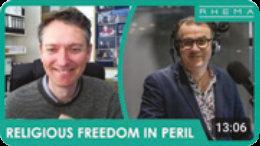















SOCIAL MEDIA
Social media is rapidly becoming the new public square—a dynamic, interactive space where ideas are shared, debated, and shaped. Platforms like Facebook, Instagram, LinkedIn, Substack, and YouTube are now crucial. We’re committed to these conversations.
Admittedly, we start from a low baseline (though one consistent with similar organisations). Nonetheless, in 2024, our social media presence enjoyed a 25% increase in followers across platforms.
Our growth and engagement metrics also stand out above the industry average compared to other organisations in our sector—a testament to the effectiveness of our strategy and the relevance of our work.
This year, our expertise has also been sought beyond our own channels. We’ve been invited onto podcasts like the New Zealand Initiative Podcast to discuss teacher training and the Revolving Door Syndrome (which has featured people like Sam Stubbs and Paul Moon ONZM) to explore the decline in trust. These opportunities allow us to reach new audiences and share our research and insights in spaces that influence public debate and policy thinking.










THE INTERNSHIP
From November 2023 to February 2024, Maxim Institute welcomed eight interns to our revitalised Internship Programme. Representing diverse disciplines and backgrounds, they brought fresh perspectives and enthusiasm to this transformative experience. After feedback on the inaugural programme, we introduced new elements to foster community and enhance leadership skills.
Senior Fellow and Director of Research Strategy
Dr Paul Henderson’s sessions remained a highlight, encouraging intellectual and spiritual growth. One intern commented: “Paul is the best teacher I’ve ever had.” A team-building week at Mahinepua was added, including activities like bushcraft and abseiling.
Leadership modules equipped interns with tools to understand their strengths and navigate challenges. The “Politics, Art and Philosophy” section also stood out, blending history with key themes and inspiring interns to consider careers in public service during the Wellington trip. While in the capital, they met high-profile MPs, top-ranking public officials, and a former Prime Minister.
The Internship’s influence continues to be felt in the success of past participants. Thomas Scrimgeour (2022/23) now works as a researcher at Maxim and recently delivered his first paper on housing. Other alumni are making their mark in parliamentary offices for MPs in and out of Cabinet to Statistics NZ, as well as advocacy organisations like Blind Low Vision NZ, the Free Speech Union, Taxpayers Union, and Ethos Alliance, which offers legal assistance on conscience issues. Interns are also working at leading law firms.



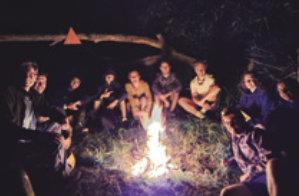
THE CURRENT INTERNS
This year’s interns are a dynamic and diverse group. Their backgrounds range from engineering and law, to communications and psychology, reflecting a shared commitment to making a positive impact.
From Allan
This internship has been an absolutely surreal experience. Every session I’ve attended has been captivating, thanks to the outstanding lecturers who have generously shared their insights. A special mention goes to PaulHenderson.


questions, and the interns whose latenight discussions have left me challenged andinspired.
The cohort is made up of remarkable individuals, each contributing something unique, and the Maxim staff have gone out of their way to make us feel welcome andsupported.
Programmes like this are rare, and we are deeply grateful to the donors who made it possible. Your support has made this transformative experience a reality—thank you for investing in our growth and potential.
From Abigail
The Maxim Internship has been a true blessing. After four years at university, these past weeks have felt like a breath of fresh air. The quality of teaching and the incredible people I’ve met have given me renewed hope for NewZealand’s future.

From Sam

Living and learning together has been equally rewarding. In just a few weeks, we’ve built deep, meaningful relationships, surrounded by like-minded interns who are passionate about learning, engaging with challenging texts, and having stimulating debates (often into the latehours).
I speak for all of us when I say we feel incredibly grateful for this opportunity. For the first time, we’re being taught how to think, and Maxim is helping us realise how the ideas we hold shape the world.
I came in thinking twelve weeks was plenty of time to tackle books, movies, and beach visits before graduation. Instead, I’ll leave with something far richer: a deep desire to work hard, build my life on the foundation Maxim has helped lay, and strive to reveal glimpses of heaven on earth.
From Elizabeth
The Maxim Internship has been truly invaluable, both personally and vocationally. The classes have enabled the debating of ideas with a depth and sincerity that I have often found lacking within tertiary settings. Even after just four weeks, I’m deeply grateful for the Maxim staff's kindness and depth of knowledge, the professors who have answered my (many)

ARIAN TASHAKKORI A FORMER INTERN

Reflecting on my three months doing the Maxim Internship, I can confidently say it was far more enriching, informative, and equipping than my four years at university. During this short time, we explored a history that revealed who we are, where we come from and the philosophical foundations of our shared society. It was not just an informative exercise but a formative journey, connecting us to truths that sustain flourishing societies.
The deep friendships I built during my time at Maxim continue to support and challenge me, including leading to my current role at the Free Speech Union, where I advocate for the structures that preserve our collective capacity to pursue truth.
Formative, foundational, and hope-giving, my internship at Maxim was truly transformative.
MAXIM COMMUNITY
MIC NIGHT
Hijacking the School Bus
In a thought-provoking panel discussion earlier this year, Maxim Institute tackled the pressing challenges facing New Zealand’s education system. Hijacking the School Bus brought together experts to address the decline in student achievement, the role of ideologies in teacher training, and the erosion of trust in the curriculum.
Fifty-five people attended in person, and 183 tuned in online to hear from key speakers, including Dr Melissa Derby, who was later appointed as the Race Relations Commissioner on the Human Rights Commission. Melissa critiqued current literacy approaches and their impact on disadvantaged students.
Also on the panel was education researcher Steph Martin, who highlighted the need for a return to knowledge-based teaching, and Maxim’s very own Maryanne Spurdle, who pointed to successful overseas examples we might implement here.
Attendees—including teachers and university lecturers—engaged with panellists in lively debates. Table discussions, underscored a shared desire for practical solutions to these challenges. Feedback from the event was overwhelmingly positive. Maxim remains committed to critical conversations about education’s future.



“This [MIC Night] was an excellent event and is the sort of conversation people need to behaving.”




BOOK CLUB
The Maxim Book Club was founded to strengthen connections within our community by reading literature that has stood the test of time. The texts we have explored—from Dostoyevsky and Tolstoy to Rand and Camus—
speak to questions about human nature, revealing undercurrents affecting NewZealandsociety.
As fewer people read these classic works or study them in school, what the Maxim Book Club offers is increasingly vital. With
nearly 50 members on our mailing list, we have a dedicated core actively contributing through our online platform and participating in regular Zoom discussions.
Why is this important? Because leaders arereaders.
ALUMNI WEEKEND 2024
Our second Alumni Weekend brought together 86 Maxim Internship alumni, recent graduates, and new staff at Cape Horn for remarkable talks, discussions, and opportunities to reconnect.
The Rt Hon Sir Bill English reflected on resilience, perspective, and faith in public life, drawing on his experience as New Zealand’s Prime Minister. Beth Isaachsen, a co-founder of Scholè, a classical one-day school, spoke about encouraging a vision of “building cathedrals” at home. She posed the question, “How can we help our children behold goodness, truth, and beauty?”
Dr Paul Henderson shared lessons on navigating change, using insights from St. Augustine during the fall of the Roman Empire. In a Q&A, Dr Stephanie Worboys explored justice and forgiveness through her research on restorative justice.
The weekend provided space to reconnect, share stories, and consider how Maxim continues to shape lives and communities. We look forward to hosting Alumni Weekend 2025!


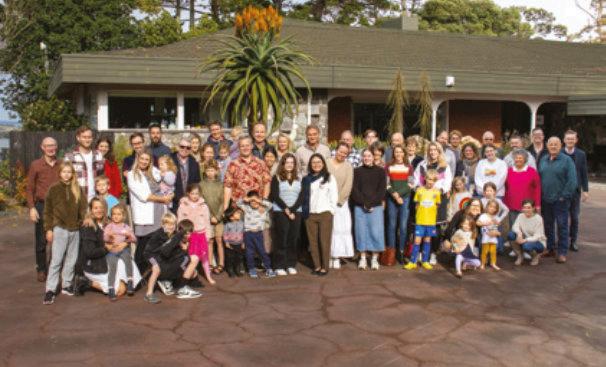



FROM GAEL GOULTER
SENIOR ASSOCIATE AT ETHOS
ALLIANCE AND FORMER INTERN
Despite it being almost 20 years ago (gasp!) since I participated in the Maxim internship, I consider that summer one of the most formative experiences of my adult life. In many ways, it was a time of unravelling for me: opening up deep and complex questions about my faith, ideas, and life’s purpose. Maxim’s staff began the work of helping me explore those questions, and I'm grateful to have continued to be challenged and encouraged by the many wonderful friendships that the alumni network has blessed me with.
Maxim has enriched my life. It has encouraged me to remember my civic duty. It has challenged me to look for ways to use my legal training and expertise to contribute to the common good. I’ve made submissions on Bills before Parliament, pushed into difficult conversations on important issues, and taken on governance roles for charities I believe in. I did this even when life's been full of work and/or family responsibilities. A particular highlight has been my involvement with the Ethos Alliance, an organisation supporting people to live out their deepestconvictions.
Maxim’s impact has been profound. I’m grateful for the opportunities it opened up and for the ways it continues to challenge me to engage meaningfully in my community.
2024 SIRJOHN GRAHAM LECTURE
Thanks to your support, this year’s Sir John Graham Lecture series showcased Maxim’s commitment to thought leadership and connection.
The programme began with a supporter lunch featuring Professor Nick Aroney. It was followed by a podcast on Why Didn’t New Zealand Become Part of Australia?, which exceeded our average YouTube engagement. In Wellington, a high-level Chatham House discussion brought together leading academics, policymakers, and a former Prime Minister to explore the future of transTasman relations.
The series culminated in the Sir John Graham Lecture on 6 September, which attracted 271 attendees, including MPs, media leaders, business figures, and church representatives. Attendees praised the event for its engaging content and warm atmosphere, and feedback called it “fantastic” and “the best of nights.”

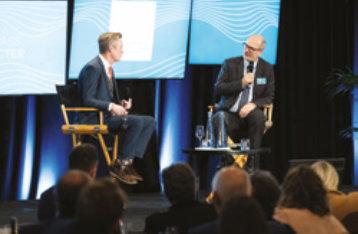
The lecture and related content reached over 26,000 people online, further expanding Maxim’s audience. By connecting thinkers, educating leaders, and fostering strategic relationships, this series demonstrated the lasting impact of thoughtful dialogue.
Together, we’re shaping conversations that matter for New Zealand’s future.







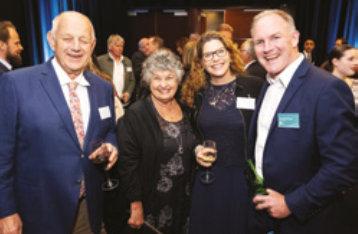





LOOKING AHEAD TO 2025: RESEARCH, ENGAGEMENT, RESULTS
2025 promises to be a year of continuing impact.
Our work on Artificial Intelligence continues with the release of a new paper, AI and the Future of Work, in February 2025. This report examines how machine learning and robotics will reshape the workplace, highlighting risks to administrative roles, customer service, and even high-earning professions.

We will also be researching education, potential changes to euthanasia legislation, and social impact bonds.
This work will help us engage directly with decision-makers, serving to create meaningful change.
While continuing to drive record engagement with print radio and TV, we’ll pursue a robust social media strategy to build our mailing list, broaden our reach, and ensure our ideas resonate across digital platforms.
The Maxim Internship will continue, nurturing a new cohort of leaders and connecting them to our Alumni network
Finally, watch out for an announcement as to who will be delivering the Sir John Graham Lecture. Remember, it’s more than one night; it’s a series ofplatforms.
Our commitment remains clear: to address today’s challenges and shape a better future for all New Zealanders.
Please support us: www.maxim.org.nz/donate

www.maxim.org.nz/donate
